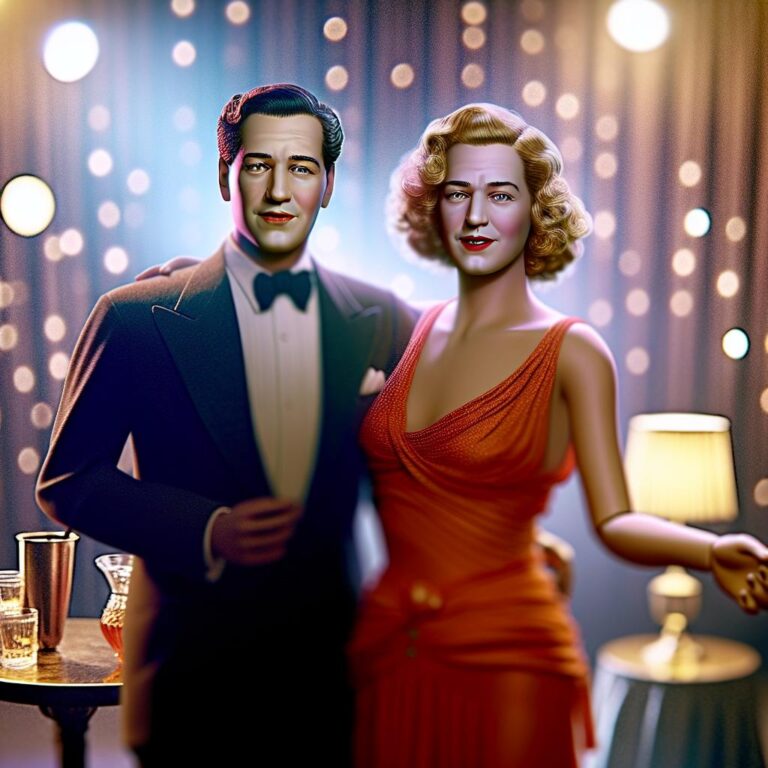Famous actors with most Oscar nominations: Who are they?
- Meryl Streep has the most Oscar nominations with 21 and 3 wins, showcasing her versatility and skill.
- Jack Nicholson has received 12 nominations and won 3 Oscars for roles in films like "One Flew Over the Cuckoo's Nest."
- Katharine Hepburn holds the record for the most lead acting Oscars with 4 wins among her 12 nominations.
- These actors consistently choose complex roles that highlight their talents and push industry boundaries.
- Oscar nominations enhance actors' careers, increasing prestige, casting opportunities, and pay.
- Performances that are authentic, emotionally impactful, and complex often receive Oscar recognition.
- Supporting roles can sometimes outshine leads, earning actors substantial acclaim.
- Historical significance lies in setting benchmarks for acting excellence, influencing generations, and redefining roles within the industry.
Ever wondered who among Hollywood's elite rakes in the most Oscar nominations? Dive into the glittering world of the top Oscar-nominated actors, where stars not only shine but also stack up those golden nods. Explore Oscar milestones that have transformed careers and demystify the factors behind these iconic nominations. From enduring presence to legendary performances, find out why these actors capture the Academy's admiration and how it shapes Hollywood's landscape.
Who are the top Oscar-nominated actors?
Talking about the Oscars can be like diving into the heart of Hollywood. Imagine a room filled with legends—those actors who have not only left a mark but have been recognized over and over again. Think of actors like Meryl Streep, Jack Nicholson, and Katharine Hepburn. These are household names that pop up when discussing top Oscar-nominated actors. Their resumes are golden, not just with accolades but with the sheer number of times they have been nominated.
Meryl Streep, for one, could practically build a house with her nominations—she has more than any other actor! She has been nominated 21 times. Can you believe that? Each nod is a testament to her talent and her role choices, which often push the envelope. From "Sophie's Choice" to "The Devil Wears Prada," her roles have been diverse and powerful. She became a highlight reels staple.
Then, there’s Jack Nicholson, a true actor's actor. A man with charm mixed with just the right dash of mischief. He’s been nominated 12 times. His range is broad, but he's often remembered for roles like Randle McMurphy in "One Flew Over the Cuckoo's Nest" or the chilling Joker in "Batman." Each of these performances has cemented his place as a multi-faceted talent within Hollywood.
Now, Katharine Hepburn, who remains an icon for winning four lead acting Oscars among her 12 nominations. Her fierce, independent spirit uplifted films like "The Philadelphia Story" and "Guess Who’s Coming to Dinner." Hepburn’s roles often broke barriers, offering strength and intelligence. What unites these actors is their willingness to challenge themselves continuously, seeking roles that not only entertain but also evoke thought.
You might be wondering what kind of roles typically secure these nominations. It's often those parts that showcase deep character exploration, depth, and a mix of vulnerability. Films need something of a certain caliber—a rawness or an authenticity that stirs emotions. Take Daniel Day-Lewis, for example, who received nominations for mesmerizing performances in "My Left Foot," "There Will Be Blood," and "Lincoln." His meticulous craftwork in bringing depth to his characters is legendary.
Now, let’s linger a bit on another legend: Sir Michael Caine. To learn more, check his IMDB profile. With two wins from six nominations, his roles range from the gritty "Alfie" to the brooding "The Cider House Rules." He has a knack for selecting roles that are innovative and occasionally go against type. Caine's versatility across generations and genres makes him a fascinating figure in Oscar history.
One important thing for these actors is not just how many times they’ve been nominated, but also how often they challenge themselves creatively. It's rare that a one-note performance will secure multiple Oscar nominations. Instead, these Hollywood legends with Oscars often have careers marked by a variety of thought-provoking roles. It's part skill, part intuition, and often about finding the right story to tell at the right time.
When considering historical figures in Oscar nominations, these actors stand out not only for their sheer number of nods but for how their films shaped the industry landscapes. Such actors have repeatedly shown us what it means to move beyond the script and embody a character with nuance and authenticity.
For those eager to delve into sweet Oscar trivia, there's so much richness to explore through generations of acting in Hollywood. Discover more about actors with multiple Oscar nominations by visiting the comprehensive Wikipedia list. As time rolls on, new stars will rise, but these legends continue to inspire countless actors worldwide.
What are the notable Oscar nomination milestones?
Oscar nominations have several key milestones that highlight significant achievements and shifts in Hollywood. The Oscars have shaped careers, celebrated hard work, and set benchmarks for actors worldwide. Several famous actors stand out for their Oscar nomination milestones, marking unforgettable moments in film history.
One major milestone is Katharine Hepburn's four Oscar wins. She holds the record for the most wins by any actor. This achievement sets a high bar for other actors. Her wins also highlight the enduring power of memorable performances. Actors who followed aspired to reach such heights.
Another significant milestone is Meryl Streep's 21 Oscar nominations. Streep's nominations span decades, showcasing her talent and versatility. Her achievement demonstrates not only her acting skills but also her ability to remain relevant. Each nomination boosts her career, making her a sought-after name in Hollywood.
In the male category, Jack Nicholson leads with 12 nominations. Nicholson's iconic roles and magnetic presence have left a lasting impact. He is a benchmark for male actors seeking recognition in the industry. His career reflects the importance of choosing impactful roles that resonate with audiences and critics alike.
Oscar nominations indeed shape actors' careers. They elevate an actor's status and open doors to new opportunities. A nomination often leads to increased interest from directors, producers, and casting agents. It can lead to higher salary offers and more prominent roles. The acclaim boosts an actor's reputation, creating trust in their ability to deliver top performances.
Actors reaching these milestones often experience a career transformation. Their roles and film choices reflect their elevated status. They have the luxury of selecting projects that resonate with their artistic vision. The industry treats them as legends whose involvement can define a film's success.
These milestone actors—Hepburn, Streep, and Nicholson—are giants in Oscar history. They set new standards for excellence and achievement in acting. Their milestones also show the Oscars as a measure of an actor's lasting legacy. Each nomination and award solidifies their place in cinematic history.
The Oscars history also marks achievements like Marlon Brando's distinct win rate. Brando has eight nominations and two wins. His roles in "On the Waterfront" and "The Godfather" became historical landmarks. His performances shook the film industry at the core and inspired actors towards depth and authenticity.
Viola Davis made history as well. She became the most-nominated Black actress in Oscars history. This milestone is crucial, shedding light on the importance of diversity. Her success encourages hopes for broader representation at prestigious platforms.
Embracing these milestones, the Oscars celebrate the art of storytelling. They inspire future actors to dream big and showcase stories that captivate audiences. The legacies of milestone achievers remain etched in the tapestry of world cinema. These stories of phenomenal actors continue to inspire future generations, urging them to achieve greatness.
Oscar nomination milestones reveal a lot about the evolving landscape of films. They highlight the achievements of remarkable talents and the industry's high standards. These milestones are not just records; they symbolize the Oscars' essence and influence in shaping global cinema narratives.
How does Oscar recognition influence an actor's career?
When we talk about Oscar nominations, we often think of golden statues, red carpets, and glamour. But let's dig deeper. Oscar nominations do more than shine a spotlight on talent; they shape careers in profound ways.
What is the career trajectory for frequently nominated actors?
The career path for actors with multiple Oscar nominations often takes a notable upward turn. An Oscar nod serves as a stamp of approval from Hollywood's elite, setting an actor apart in a crowded industry. Why does this matter? Because it can open doors to roles that might otherwise remain out of reach. With each nomination, an actor's reputation for excellence grows, leading to high-profile roles.
Actors like Meryl Streep benefit greatly from repeated nominations. Her trajectory shows consistent opportunities in both complex and mainstream roles. These nominations do not just bring prestige; they build a track record of reliability in the industry. Directors and studios see these actors as sure bets.
How does Oscar recognition affect future casting opportunities?
Oscar recognition is like a key unlocking new casting opportunities. It signals to casting directors that an actor has both skill and appeal. After their first nomination, actors often see scripts pour in. Offers become diverse, allowing them to explore different genres and characters.
For instance, after gaining Oscar nods, actors often land roles that are more rewarding or challenging. This escalation stems from the added visibility an Oscar nomination brings. When a studio markets a film, an "Oscar-nominated" tag on the poster can attract a broader audience. This often translates to better chances of being cast in future films.
What is the long-term influence of Oscar accolades?
The effects of Oscar accolades can last far beyond the night of the awards. They bestow on an actor a lifelong label of distinction. Often, having "Oscar-winning" or "Oscar-nominated" preceding an actor’s name adds a layer of acclaim.
Long-term, these nominations carve out a lasting legacy for actors. They pave the way for becoming acting legends, admired and studied by future generations. Actors like Jack Nicholson and Katharine Hepburn remain deeply respected, not just for their talent, but for their enduring Oscar recognition. Their accolades signify a level of achievement that few attain.
Oscar recognition also contributes to negotiating power. An actor with multiple nominations often commands higher pay. The industry sees this as investing in quality and prestige. This, in turn, leads to creative freedom, as actors can choose projects that align with their artistic visions.
In summary, Oscar nominations impact careers in several lasting ways. They enhance reputations, improve casting prospects, and set the stage for higher artistic and financial rewards. Admired for their talent, actors with multiple Oscar nominations continue to influence Hollywood's evolving landscape. Their journeys inspire both colleagues and aspiring actors, shaping the industry for years to come.
What trends exist among actors with enduring Oscar presence?
Certain patterns emerge among actors consistently nominated by the Oscars. Some actors have a knack for choosing roles that catch the academy's eye. Their decisions reflect a keen understanding of what makes a performance memorable. These actors select complex and challenging roles, often diving into diverse genres.
Actors like Spencer Tracy and Meryl Streep have mastered this art. Their dedication to their craft is unmatched. They show that perseverance and talent go hand in hand. Take Spencer Tracy, for example. You can see his impressive filmography on IMDB, where his range and talent shine. Tracy and others like him often work with renowned directors. They team up for projects that stand out.
Some recurring factors contribute to persistent Oscar nominations. Firstly, skill is essential, but connections in the industry help, too. Collaborating with top directors and writers can elevate an actor's status. Such collaborations produce work that stands out in the Oscar race. Secondly, established actors often secure roles in films with substantial backing. These projects have better resources for promotion and reach.
Age and experience may give actors an edge. Seasoned actors like Jack Nicholson and Glenn Close often have extensive networks. These networks support their nominations. They have proven track records and continue to grow by embracing new roles.
Prolific nominated actors, as seen with Meryl Streep, often reflect a blend of persistence and skill. Streep has the most acting nominations of all time. Her selection? Based on her ability to transform into varied characters.
Gender and genre preferences can influence trends. Historically, male actors dominated Oscar nominations. However, this gap is closing with more women receiving recognition. Genre also plays a role. Drama films tend to garner more attention than action or comedy. Dramatic performances allow actors to showcase depth and complexity.
Female actors, like Katharine Hepburn, have made history with smart role choices in drama films. Though fewer comedies get nominations, versatile actors can still break through in any genre. Their ability to infuse life into characters makes their performances unforgettable. They challenge typical roles and redefine them to fit their vision.
Always, the actors' dedication and understanding of cinema illuminate their careers. Pressures may come and go, but these actors remain steady. They continue to provide audiences with outstanding performances. Ultimately, their consistency at the Oscars reflects more than talent. It reveals a unique work ethic and passion for storytelling.
In essence, a combination of choices, skill, and connections contributes to enduring Oscar presence. It's not just about talent but using that talent strategically. Understanding industry expectations plays a key part, as does the ability to redefine acting with each role. Such actors keep the magic of cinema alive. Each nomination stands as a tribute to their unwavering dedication to the art.
Why are certain performances highly recognized by Oscars?
An Academy Award can change an actor's life. But what makes a performance Oscar-worthy? It all starts with a strong connection to the character. Actors who bring depth and truth to their roles often catch the eye of the Oscars. Let’s explore why some performances rise above others to earn this hallmark of acting achievements and iconic status.
First off, authenticity in an actor's portrayal is key. When an actor makes us forget we're watching a performance, that's when the magic happens. Their transformation into this character must be complete, leaving their own self behind. Such performances bridge the gap between fiction and the audience. Think of Daniel Day-Lewis as Abraham Lincoln. He did not just imitate Lincoln; he encapsulated his essence, creating an intricate, lived-in portrayal. This kind of depth impresses Oscar voters, as it goes beyond the script.
Another element is the emotional impact. Performances that stir powerful emotions within the audience often get recognition. Actors who evoke tears, laughter, or even discomfort sometimes linger in the mind long after the film ends. This is what the Oscars look for: performances that affect us deeply. Take Lupita Nyong'o in "12 Years a Slave"—her portrayal of Patsey was both heartbreaking and honest, making her performance unforgettable and award-winning.
Moreover, complex roles are usually recognized by the Oscars. Characters with multiple dimensions or who experience significant growth provide actors opportunities to showcase their range. These roles require immense skill, as they often involve shifting emotions and motivations. Marlon Brando's role in "On the Waterfront" is a classic example. He portrayed Terry Malloy with layers of vulnerability and strength that left audiences in awe, cementing his status as an acting legend.
Historical context can also play a role in an Oscar-worthy performance. Some stories hold significant cultural or historical importance, and an actor's interpretation of such stories can highlight their skill and the narrative's relevance. Consider Halle Berry in "Monster's Ball," her role was groundbreaking and came at a crucial time in Oscar history, marking a shift in the recognition of diverse talents.
Of course, critical acclaim can't be ignored in the nomination process. Critics often interpret and highlight elements of a performance that might otherwise go unnoticed, drawing attention to promising contenders. These reviews can create a buzz, generating more interest in an actor’s work. When performances start getting applauded by critics, the Oscars often follow suit. Joaquin Phoenix in "Joker" had a role that garnered significant critical praise, catapulting him to Oscar recognition.
Hollywood insiders also influence Oscar nominations. Individuals in the industry might advocate for performances they find impressive, regardless of critical stances. These insiders, part of the Academy, are not just voters but are also participants in discussions about what makes a performance Oscar-worthy. They recognize the technicalities and nuances only a professional can identify.
Additionally, trends in society and film can shape what the Oscars recognize. If certain themes or styles are popular, performances in these areas might gain attention. The industry's mood swings can dictate the types of performances that are honored, reflecting current societal issues or interests. For instance, the rise of biographical films has led to many nominations for actors portraying real-life figures.
The number of historically recognized performances is extensive. Many actors have delivered standout roles that have left a mark on Oscar history. From iconic speeches to silent emotional moments, these performances define the range of what can be achieved in acting. Elyse Dinh in “Crash" and Tom Hanks in “Forrest Gump" demonstrated this through diverse, memorable screen moments.
Critical acclaim spotlights talent, but ultimately, consistent excellence marks an Oscar-nominated performance. It's a testament to enduring skill, creativity, and dedication to the craft of acting. Each year, new performances join the ranks of history’s greats, celebrated for their contributions to the art of storytelling.
How are Oscar nominations divided among acting categories?
Oscar nominations occur in distinct acting categories, chiefly leading and supporting roles. But what makes these categories different? The main difference lies in the screen time and plot involvement. Lead roles hold the story's focus, guiding the film's direction. Meanwhile, supporting roles enhance and complement the lead characters, adding depth to the narrative.
Distinctions between Lead and Supporting Nominations
Think of a lead actor. This actor is the main character driving the plot forward. They hold our attention and carry the movie's theme. In most cases, lead roles are central to the story. In contrast, supporting actors fill in essential but secondary roles. They help shape the movie's world by adding emotional layers and context. A lead nomination signifies that the actor played the pivotal part. A supporting nomination honors performance that enriches the main story.
Which Category Sees More Nominations and Wins?
Over the years, lead categories tend to offer more nominations and wins. Take the Best Actor in a Leading Role for instance. This category gets much recognition because of its central importance. But, it's essential not to overlook the supporting roles. Many famous actors have soared from these roles. There are several examples where supporting actors outshine leads. Think of Heath Ledger's famous Joker performance; it remains unforgettable, even as a supporting character!
Nominations and Overall Career Success
We might wonder how these nominations affect careers. Getting nominated, let alone winning, can lead to bigger projects. An Oscar-nominated actor gains prestige and credibility. This often translates into better roles and higher pay. Even if they don't win, the nomination itself elevates their profile. But, there's more to career success than just nominations. Some actors with multiple Oscar nominations haven't won. Yet, they still carve impressive careers. Think of Leonardo DiCaprio before his win. It shows that talent mixed with consistent recognition builds a lasting career.
Final Thoughts on Oscar Nominations
So, here’s what we know: Oscar categories recognize lead and supporting actors. They appraise not only for star power but also emotional contribution. Lead categories generally see more action in terms of nominations. However, supporting roles also achieve considerable acclaim. Whether it’s DiCaprio or Ledger, Oscar nominations symbolize respect across the industry. They fuel actors’ careers, leading to iconic opportunities. The significance unfolds with each nod, shaping Hollywood's brightest stars.
What is the historical significance of Meryl Streep, Jack Nicholson, and Katharine Hepburn in Oscars?
Meryl Streep, Jack Nicholson, and Katharine Hepburn define Oscar prestige. They hold records with their Oscar nominations, shaping film history. Meryl Streep won 3 Oscars and earned 21 nominations. She has the highest number of acting nominations ever. Her record began with "The Deer Hunter" in 1979. Iconic roles like Miranda Priestly in "The Devil Wears Prada" showcase her range. Her performances mix emotional depth and skill, making her an industry icon.
Jack Nicholson shines as one of Hollywood's finest. IMDB Jack Nicholson showcases his brilliance with 3 Oscar wins and 12 nominations. His roles vary widely but are always striking. "One Flew Over the Cuckoo's Nest" and "Terms of Endearment" brought him Oscar wins. With his unique intensity, he sets a standard for actors today. Nicholson's performances influence many, inspiring generations of actors.
Katharine Hepburn remains unmatched in Oscar history. With 4 wins and 12 nominations, she set an incredible record. Her role in "The Philadelphia Story" confirmed her genius, as did "Guess Who's Coming to Dinner." Hepburn's career transformed the perceptions of female lead roles. Her poised and powerful characters paved the way for future actresses. She remains a guiding light for compassion and strength in acting.
These actors do more than win awards; they create benchmarks. They chart paths that redefine acting excellence. Nicholson brought gritty realism, while Streep gifted emotional nuance. Hepburn exuded grace and power, defining leading female roles. They set standards that inspire actors to strive for extraordinary achievements.
These legends reshaped the film industry. They raised the bar for storytelling and performance. Young actors look to them as icons. Aspiring artists study their techniques. Oscar nominations reflect skill, and these three consistently prove it. Their work leaves a lasting mark, influencing generations across the globe.
Meryl Streep's adaptability continues to push boundaries. She dives fearlessly into diverse roles. Be it drama, comedy, or musical, she does it all. This versatility sets her apart and drives others to pursue diverse projects. Her success from artful selections influences casting trends.
Jack Nicholson's intensity engages viewers fully. His acting style influences modern performances. Many actors draw from his expressive methods. With vibrant characters, he redefines what supporting or leading roles can offer. People say, when Nicholson steps on screen, the viewer feels the actor's soul. His work challenges and excites, teaching actors to embrace bold roles.
Hepburn's legacy champions strong, dynamic women. Her legacy teaches that females can lead fiercely and compassionately. As a pioneering woman in film, she set standards now normalized. Young actresses emulate her strength. Her spirit endures, motivating a powerful presence.
These actors make more than movies; they make history. They inspire change within the industry and beyond. They challenge norms, push limits, and uplift narratives. The Oscars remain a measure of cinematic achievement, and these three elevate it. Through skill and vision, they continue influencing the evolution of film. They revolutionize storytelling, acting, and imagination. Their lasting impact resonates forever in Hollywood's halls.
Conclusion
We explored Oscar-nominated actors and their career journeys. Frequent nominations often boost fame. Iconic roles, like those of Meryl Streep, Jack Nicholson, and Katharine Hepburn, set benchmarks for success. Milestones in Oscar history also shape careers and industry trends. Understanding these patterns helps grasp who stands out and why. Actors with consistent nominations often enjoy long, successful careers. Oscars influence roles and opportunities, guiding future performers. Celebrating these achievements highlights the importance of talent and hard work. So, let’s keep an eye on these legends and upcoming stars on the Oscar stage.







